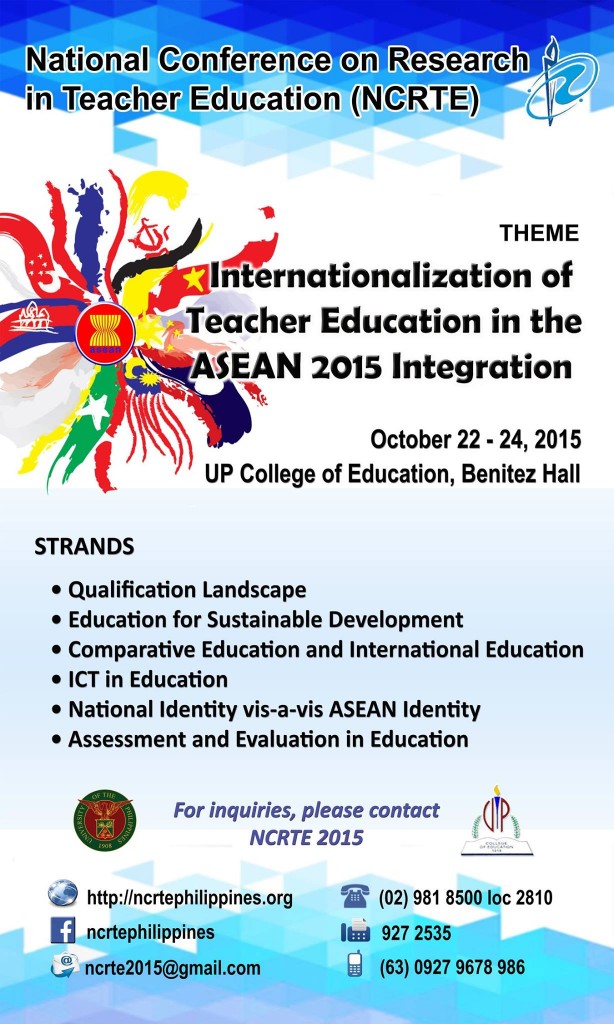Abstract Submission
1. Deadline for submission of abstracts (250 – 300 words) via email is on August 16, 2015. You will be notified of acceptance by August 30, 2015.
2. All submissions should:
– be in Arial or Times Roman Font, Size 12
– summarize the important points of the proposed presentation and contain an outline of the objective/s, methodology, results and conclusions of the research undertaken
– not include tables, figures or references
– be written in paragraph form
3. Please submit your abstract proposal using the NCRTE 2015 Abstract Submission Form. If you have concerns about your submissions, please email : ncrte2015@gmail.com
4. All accepted research papers will be included in the conference proceedings.
You can submit up to two (2) proposals on any of the following strands:
STRANDS
1. Qualification Landscape – standards, practices, and policies in adopting to the changes ensued by ASEAN integration
– Quality Assurance and Mutual Recognition of Qualifications
– Regional and National Qualification Framework
– Qualification and Certification practices
– Pathways and Equivalencies
– Promotion and Regulation of Profession
– Career Guidance
2. Education for Sustainable Development – strategies, initiatives, practices and trends in the improvement of, and resource generation, allocation and utilization for education
– Public-Private Partnership
– Academic entrepreneuralism
– Environmental and Health Education
– Pedagogical Approaches to Education
– School based management (or Decentralization of Education)
– Essential skills in teaching and learning process
– Competencies of 21st Century Educational Leaders, Administrators, and Managers
3. Comparative Education and International Education – trajectories, realities, and prospects in teacher education through international and intercultural research.
– Critical Issues in Teacher Education
– Area Studies, Cross-national Studies in Teacher Education
– Intercultural Understanding
– Exchange programs
– Educational Institutions’ Credit Transfer Scheme
– Multiculturalism
– International Alignment of Courses Among Universities
4. ICT in Education – best practices in the use of technology in teaching and learning
– Digital Citizenship
– e-Learning
– Blending Learning Environment
– Gamification
– New media emerging technologies
– Professional learning networks
5. National Identity vis-à-vis ASEAN Identity – diversity and dynamics of ASEAN cultures towards harmony and synergy
– Filipino identity in the ASEAN community
– ASEAN identity
– Citizenship and Democratic Education
– Education and the Law
– Values Education
6. Assessment and Evaluation in Education– trends, policies, prospects in assessment and evaluation in education
– Classroom Assessment Practices
– Test and Instrument Development and Validation
– Sociometric and Non-Sociometric Techniques in Guidance
– Assessment of Professions and Professional competence
– Monitoring and Evaluation of International Programs
– Monitoring and evaluation of the practice of the profession
– Evidence based research on/for ASEAN integration





